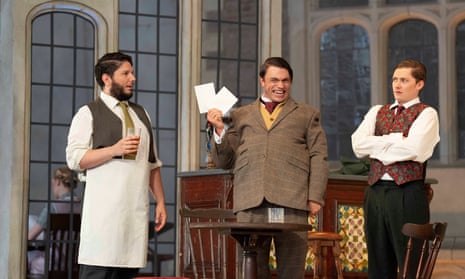Sir John in Love is an odd choice for a youth opera company in 2022. Yes, it’s Ralph Vaughan Williams’s 150th anniversary year and yes, BYO has long made a point of staging less known repertory. But if this opera was ever hilarious rather than twee (emerging from the “cowpat school”, as Elisabeth Lutyens branded the musical pastoralism of RVW and co), its comedy has aged badly. There aren’t just endless fat jokes – it’s a Falstaff plot, after all – but French jokes, Welsh jokes, class jokes and jokes about men marrying men.
More seriously for a production whose unequivocally talented personnel are all at the start of operatic careers, Sir John in Love is a piece dominated by older characters, including its title role, and with multiple generation gaps at its core. And don’t get me started on the vocal ensembles, whose auto-muddiness is beyond the reach of any surtitling.
BYO’s largely excellent, endlessly spirited performance was thus achieved against the odds. It was carried along by Johannes Moore’s irrepressible Falstaff – his behaviour all the more appalling (and altogether less funny) without the usual trappings of age. Moore also had the vocal wattage to project over Southbank Sinfonia’s deluxe rendering of Vaughan Williams’s orchestral score in the ever-ungenerous acoustic of Opera Holland Park’s tent, which caused difficulties for others, already attempting to summon a level of vocal gravitas several decades out of reach.
The female roles, perhaps inevitably, fared best: Lexie Moon (Alice Ford) and Eva Gheorghiu (Meg Page) stood out as assured and technically equipped, while Grace Marie Wyatt’s smaller, harder-edged voice as Anne Ford was nicely matched to Steven van der Linden’s pleasant light tenor for Fenton – and the young lovers were sensibly given an auditory leg-up by being brought in front of the orchestra for their big moments.
The opera’s alternation of folk tunery and post-Wagnerian modernism can be hard to pace, but conductor Marit Strindlund kept the momentum up and drew exquisite woodwind solos as well as fine string playing from the orchestra. The chorus also produced a vast, brilliantly blended sound – just a shame they had so little to do.

Comments (…)
Sign in or create your Guardian account to join the discussion